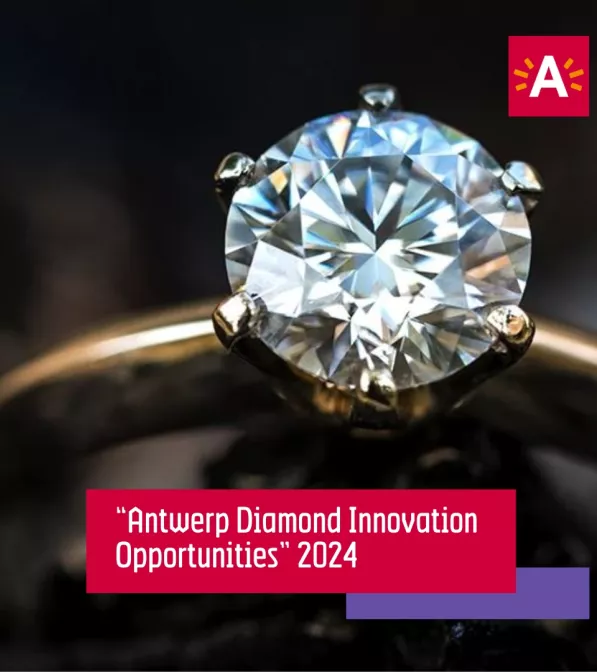Antwerp: popular testbed for digital innovation and entrepreneurship

- Home
- News & events
- Antwerp: popular testbed for digital innovation and entrepreneurship
Antwerp is a compact cosmopolitan city with 527,000 inhabitants of more than 170 nationalities in a 200-square-kilometre area. The city is multilingual by nature, as many Flemish people fluently speak several languages such as their native Dutch, as well as French and English. These diverse demographics make it an appealing place for trialling new products and innovations.
“Due to many people in Flanders being able to speak multiple languages, they are much more inclusive by nature. Antwerp is an attractive city for international people, who feel welcome to speak any language here,” says Bie De Graeve, director of executive education at Antwerp Management School (AMS).
Centred on the harbour that brought people from around the world to settle in Antwerp, the city is proud of its inclusivity, which both makes it a popular base for international talent, companies as well as the testing of new products and ideas. “We [are] open-minded [and that is a key factor behind our] expertise. People who work in this region, in my opinion, typically have the attitude of embracing complexity, trying to understand paradoxes and how to work with them,” says Steven De Haes, the dean of AMS.
Testbed environment
Having such diverse demographics is also ideal for testing new medical products and innovations, “as whatever population group you are targeting in research on certain pathologies, the chances are you will find that group in Antwerp”, says Tom Braekeleirs, head of Blue Health Innovation Centre, a consortium working towards healthcare innovation.
At the centre of much of the digital innovation happening in the city is The Beacon, an ecosystem set up in 2018 that brings together academia, start-ups, scale-ups and established companies that focus on the Internet of Things (IoT) and AI to discover and develop solutions for smart cities, logistics and Industry 4.0.
The Flemish government is committed to make the whole Flanders region smarter through digital innovation, beginning in Antwerp and then expanding out to the wider area. “Antwerp is the largest European IoT testbed for smart cities,” says John Baekelmans, vice-president at independent non-profit research institute Imec, a world leader in nanoelectronics and digital technologies and founding partner of The Beacon.
Through its 'smart zone' – a testbed area of about 2.5 square kilometres in the city centre with a diverse mix of social demographics – Antwerp is testing digital innovations to improve the city in response to public demand, such as improving social cohesion within public squares and increasing the efficiency of the traffic light system. Challenges in areas such as transport, general living and air pollution are prioritised and addressed through “a close collaboration with the citizens of Antwerp”, says Mr Baekelmans.
Among the numerous projects being worked on is a testbed for a ‘smart highway’. “Antwerp is one of the most congested cities in the world and we are looking at how we can somehow aid those congestion problems by finding a better way of letting traffic flow through the ring road,” says Steven Latre, director of the IDLab Antwerp research group, which is part of Imec.
Driving innovation
One ambitious start-up at The Beacon is Helicus, a company that hopes to deliver medical supplies to hospitals across Antwerp using drones. The city's openness to digital innovation is highlighted by all 21 hospitals across Antwerp signing up to Helicus’s services; it had its first urban test run in September 2019 and hopes to be fully operational by 2021.
“We are striving to improve efficiencies in the medical sector amid a backdrop of increasingly specialised hospitals and strained government budgets,” says Helicus managing director Mikael Shamim. The company has found a supportive base as The Beacon’s “values of innovation, collaboration, information exchange and sustainability resound with ours”, he adds.
The Port of Antwerp is also promoting digital innovation at The Beacon via NxtPort, a data platform established to create greater transparency in supply chains, to drive operational efficiency and innovation in the port as well as in global supply chains. Start-ups based at The Beacon also work on other port innovations, such as Seafar, which is developing technology for unmanned ships in the Port of Antwerp.
Start-up stimulation
Beyond the exciting digital innovations in Antwerp there is also a concerted push to engage students to provide the next generation of both start-ups and talent. Initiatives such as TakeOffAntwerp, created in 2014 to promote student entrepreneurship, and the Student Organisation for Innovation and Co-operation, which has roughly 900 members, demonstrate an environment conducive to future ideas and start-up development.
“We are ensuring that students are brought into the ecosystem of innovation and entrepreneurship,” says Georges Goffin, policy secretary at the Antwerp University Association.
Antwerp’s start-up ecosystem is exemplified by StartupVillage, an innovation hub in the city centre that provides support for start-ups through its affordable office space, proximity to research institutes and access to expertise from organisations such as Blue Health Innovation Centre.
“There is a lot of innovation happening in Antwerp, but sometimes in silos, so jointly with the city we’re trying to bring it together and combine it into one overall ecosystem,” says Mr Braekeleirs at Blue Health.
Antwerp has seen a recent surge in the number of start-ups and scale-ups active in the city, which rose by 123% to more than 400 from 2012 to 2018, while the level of capital raised rose more than fourfold over the same period. Startup Genome ranked Antwerp in the top 30 global start-up ecosystems for funding in 2019, and estimated its total ecosystem value to be $7.7bn compared with a global city average of $5bn.
With organisations across Antwerp committed to digital innovation that can ensure it is a liveable, sustainable and smart city, together with the requisite start-up infrastructure and a strong talent pool, the city's reputation for innovation seems to be in safe hands.
Click here to view the article on FDI’s website and read the “Antwerp: smart and sustainable” special report in full.


